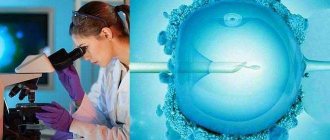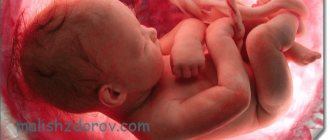17.07.2020 20533 0
The seventh week of pregnancy is almost the middle of the first trimester. At this time, the future systems of the child’s body are actively developing, so a woman should take special care of her condition. Registration, tests, ultrasound - for those who become mothers for the first time, all this looks like a completely new world. And there is no need to be afraid of it: the main thing is to understand what is happening and know what to expect.
Body changes and new sensations for women
Some pregnant women still suffer from toxicosis. Because of this, a woman often loses her appetite at week 7 and her taste preferences change. However, some lucky women do not even know what it is, while others, on the contrary, suffer from toxicosis throughout the entire pregnancy. Many people may experience whitish discharge in the form of flakes. Heavy discharge during pregnancy (not always, but often!) indicates the development of candidiasis (thrush). During this period, a woman feels tired and overwhelmed. And her mood against the background of hormonal changes is like changeable weather: sometimes bright sunny, sometimes grey-rainy, sometimes violently hurricane-like. Despite such emotional swings, your partner probably really likes you now - your figure has become more feminine (your breasts have increased by 1-2 sizes, and your hips have become rounder).
Mother
Hormonal changes in the body continue. Most likely, you are experiencing increasing outbursts of emotions. If you begin to get irritated over the slightest reason, cry for no apparent reason, or have inexplicable anxieties and fears, then everything should be blamed on hormones that provoke unexpected outbursts in your mood.
Many women, upon learning about pregnancy, wonder whether it is possible to have sex? It is possible and necessary. Just let your intimate relationships be calmer. Avoid awkward positions.
Ksenia Solovey
Lactation consultant
From the moment of conception, due to changes in hormonal levels, changes begin in the mammary glands aimed at preparing for lactation. Glandular tissue develops, the number of alveoli and milk ducts increases, and blood supply increases. All this leads to breast growth, a feeling of heaviness in it and even pain.
Increased sensitivity of the skin in the nipple area occurs not only due to an increase in the size of the mammary glands, but also due to the inclusion of a mechanism for maintaining pregnancy. It is believed that nipple irritation promotes the production of oxytocin, the hormone responsible for uterine contractions, so the appearance of unpleasant sensations in the breast area protects against unnecessary touching and unwanted stimulation. Most often, these phenomena occur in the early stages and disappear after 7 weeks, but in some women they can persist until the end of pregnancy, in a mild form. Sometimes increased sensitivity occurs in the second trimester of pregnancy and is usually associated with the appearance of colostrum.
Discomfort caused by increased sensitivity in the nipple area cannot be cured. You can only reduce the intensity. To do this, you need to pay attention to the selection of underwear. It should not restrict movement and contain a synthetic component so as not to cause additional skin irritation. Maintaining a sleep-wake schedule, proper nutrition, limiting foods that excite the central nervous system (coffee, strong tea, spicy foods), physical exercise, hygiene procedures - all this will help cope with temporary troubles. Additional assistance will be provided by taking sedative herbal medications. The entire plan of action aimed at improving the psycho-emotional state and physical well-being must be agreed upon with the attending physician. If necessary, you should consult a mammologist to rule out breast diseases that may appear for the first time during pregnancy (mastopathy, cysts, neoplasms).
What happens in a woman's body?
At week 7, the placenta continues to grow, it becomes thicker, and the umbilical cord firmly connects the embryo to the wall of the uterus.
- Slight, light-colored vaginal discharge may appear - this is due to the fact that under the influence of hormones, the flow of blood to the uterine epithelium increases. Such discharge in the 7th week of pregnancy is considered normal.
- A mucus plug is formed that covers the cervix and protects the fetus from possible infections from the outside. This plug will protect the baby until birth.
- Due to hormonal changes, a redistribution of adipose tissue occurs, and the figure acquires a more rounded outline, although the stomach is not yet noticeable to others, but changes in the figure are visible to an experienced eye.
- The breasts gradually increase in size, a tingling sensation may appear (as in your youth, when the breasts were just growing), and the areolas (pigmented areas of skin around the nipples) darken.
Burda Media
Mom's belly
The belly of the expectant mother is the subject of her special pride. But it’s too early to brag about the size of the belly - it has increased by only a few centimeters. But at week 7 the uterus is already twice its previous volume. Her ligaments are constantly stretched, which causes pain in the sides and lower abdomen. Aching, painful symptoms are normal for the first trimester of pregnancy. The doctor will prescribe special medications that will alleviate the woman’s condition. If the unpleasant sensations are accompanied by bloody discharge from the genital tract, it can no longer be ignored. In such a case, you should immediately seek medical help.
Pulls in the lower abdomen
During the seventh obstetric week of pregnancy, the expectant mother may experience occasional unpleasant pain in the lower back and abdomen. This is explained by the fact that a woman’s uterus grows, slightly enlarging her stomach. These symptoms should not cause panic or active concern.
However, there is some possibility of termination of pregnancy. Therefore, the expectant mother should be wary if painful and uncomfortable sensations shift to the lower abdomen. This situation requires consultation with a specialist.
Increased uterine tone and possible miscarriage can be avoided by following a number of simple rules. Avoid high-heeled shoes, ensure that your physical activity is moderate, avoid stress and strong emotional experiences, and try not to take hot baths.
Tests and ultrasound
If a woman has not done this before, doctors will suggest that she undergo an ultrasound at 7 weeks to make sure that an “interesting situation” has occurred and check the condition of the embryo. Experts believe that ultrasound during pregnancy is absolutely harmless to the child, and the benefits and possibilities of such research are beyond doubt. Has your pregnancy been confirmed? It's time to register with the antenatal clinic or contact any other commercial medical center. Standard procedures for registration are as follows:
- height and weight measurement;
- blood pressure measurement;
- blood tests (general analysis, blood biochemistry, coagulability, blood group and Rh factor, sugar, HIV, RW (for syphilis), Hbs antigen - for viral hepatitis B, TORCH infections);
- general urine analysis;
- stool analysis for oviworm;
- vaginal smear (to detect sexually transmitted infections).
A pregnant woman also needs to visit a therapist, ophthalmologist, dentist and have a cardiogram done.
Nutrition at 7 weeks of pregnancy
Let's continue to eat right. This means avoiding junk food and preservatives. We remember that now all the body’s forces should be aimed at maintaining the vitality of the baby. However, nutrition during pregnancy should not be monotonous. The leaders in the ranking of the healthiest foods are dietary meat (for example, rabbit), cereals, cottage cheese, vegetables and fruits. You should avoid foods that promote gas formation (fried potatoes, cabbage), as well as fatty and fried foods, sweets (this is especially true for those who suffer from attacks of nausea in the morning).
How to relieve toxicosis during pregnancy? Doctors advise eating small portions 5-6 times a day. Sour apples, tea with lemon, citrus fruits, kefir, dried fruits, rosehip infusion, as well as crackers and nuts eaten on an empty stomach are great help.
What physiological changes occur in the body in the seventh week of pregnancy?
For a woman:
During this period, mucus forms in the cervix. She will clog it and the so-called plug will come out before giving birth. Gynecological examination is not recommended this week.
The amount of calcium in the blood decreases due to the formation of bones in the child. It is necessary that the pregnant woman’s menu contains enough of this microelement. Hemorrhoids may worsen.
Increased amounts of progesterone relax the intestines, which leads to constipation and bloating.
In the fetus:
The fetus has the rudiments of almost all organs and resembles a little man with a tail. It is impossible to distinguish a boy from a girl, since the genitals are identical-looking ridges.
- The skeletal system is actively developing.
- The teeth are being laid.
- The most important thing happens in the endocrine system. The thymus gland begins to work, so T-lymphocytes appear in the fetal blood. Their life activity can last for decades, and sometimes for a lifetime.
- The adrenal cortex begins to develop.
The baby begins to distinguish between emotions and stress. Therefore, it is very important for the mother to remain calm.
The fruit size is 11-13 cm. Weight is approximately one gram.
Vitamins
Vitamin E during pregnancy (it is very important in the first trimester!) not only helps strengthen the immune system and preserve the beauty of the mother (experts recommend taking it for dry skin, brittle hair and nails), but also plays a vital role in the formation of the placenta. Don't forget about folic acid - it is involved in the creation of new cells; if it is not enough, the growth of the embryo slows down. Other essential mineral supplements and vitamins for early pregnancy include calcium, magnesium, iodine, and vitamins A, C, and B.
Sex at 7 weeks pregnant
Many women, after registering, believe that love games are now prohibited for them. This is wrong! Sex during pregnancy, if nothing threatens the “interesting situation,” is acceptable. It is better to make love (both in the early and late stages) with a condom, which protects against unnecessary infectious diseases. But it is better to refuse sexual toys (dildos, vaginal balls). This applies not only to the 7th week, but also to the entire period of pregnancy. The same applies to vibrators, which, according to experts, can negatively affect the cervix.
Seventh week of pregnancy: signs and sensations
This period is often associated with a deterioration in the well-being of a pregnant woman. Most often these are mood swings, appetite and sleep disturbances.
Here are the most common complaints of women and their feelings in the seventh week of pregnancy:
- Sleep problems, anxiety.
- Inexplicable and prolonged fatigue, apathetic state.
- Morning sleepiness is especially common in the seventh week of pregnancy.
- Women begin to complain about changes in the condition of their skin: it can become loose, oily, or, conversely, dry and flaky. But hair most often acquires a healthy appearance and volume. However, hormonal imbalance in some cases leads to hair loss.
- Nausea, vomiting in the morning. If vomiting does not stop for a long time, it can threaten the health of the mother and child. At times, even hospitalization is required.
Lifestyle
A child at this stage is very vulnerable, so it is necessary to avoid everything that, in your opinion, could harm him: no heavy physical activity, antibiotics, alcohol or smoking are out of the question! In addition, beware of infection and do not self-medicate. If you feel that something is wrong with you, consult a specialist. But once again, don’t panic - all negative emotions are transferred to your baby, and this, as is known, negatively affects his growth and development.
Care
Try to get more rest. Don't sit for a long time without moving. At work, be sure to do a warm-up, and better, if possible, take a walk in the fresh air.
If you notice that your hair has become dry, change your regular shampoo to a specialized one, and after washing your hair, apply hair oil to the ends.
Pay attention to your breasts - they have already begun to grow. It's time to start using special creams that strengthen your delicate skin and prevent it from stretching. This will help avoid stretch marks after childbirth when the milk arrives.
Source: Pixabay
It is important!
In the seventh week, the risk of miscarriage is still very high; the expectant mother needs to carefully monitor her body.
You will experience a pulling pain on the sides - this is how the uterine ligaments react to tension. If the pain is moderate and does not cause you obvious discomfort, there is nothing to worry about.
Heavy discharge - leucorrhoea - is also normal for this period, but you need to inform your doctor about it.
Invalid:
- cramping pain in the lower abdomen;
- bloody issues;
- long aching pain.
10 films about pregnancy
Beauty and accessories
At week 7, due to hormonal changes, unwanted pigment spots may appear on the face. This can be avoided if you eat right and take all vitamin and mineral complexes prescribed by your doctor on time.
The condition of hair and skin may also deteriorate, which is also associated with a lack of nutrients in the body. In any case, don't worry: these changes are temporary! If your hair has become more brittle, avoid dyeing or perming during pregnancy. As for your nails, try to protect them from the aggressive influence of household chemicals. And don’t forget to continue rubbing olive oil into your belly skin to avoid stretch marks.
What's happening
At 6–7 weeks, connections are formed between nerve fibers and the rudiments of internal organs, and five brain vesicles are formed - exactly the number of sections in the adult brain.
The spine continues to rapidly lengthen and acquires a physiological curve. If at the beginning of the week the growth of the embryo from the crown to the tailbone was 4–5 mm, then by the end of the week the baby has already reached the size of a pea (11–13 mm). His weight is now 1.3 - 1.7 g.
At the 7th week of pregnancy, the gill slit is tightened, but the embryonic tail is still preserved. During this period, the rudiments of the hands are divided into two segments: the forearm and the shoulder. Carpal membranes appear on the arms and legs, in which the fingers will develop, but the baby’s body is still asymmetrical (the upper limbs grow faster than the lower limbs).
At a period of 7 weeks, the embryo develops a nasal fossa and fold, further formation of the organs of vision occurs (the eyes move closer to the bridge of the nose, eyelids are formed, the iris appears, pigment appears in the retina), jaws and the rudiments of teeth are formed, and in the place where the ear should be , the auditory tubercle “grows.” Primary sex cells are sent to what will later become the reproductive system: in the 6th – 7th week of pregnancy, gender identification will occur (the sex glands will turn into either testicles or ovaries, and genitalia will develop from the now formed bulge in the perineum).
Also, at a period of 7 weeks, the skeletal system begins to form, the epidermis is formed, future bronchi are formed, and the endocrine glands, lungs, and kidneys continue to develop. The rectum and bladder are separated from the primary intestine, and the esophagus and trachea are separated. By this time, the bile ducts in the liver, large intestine and appendix have already completed their formation.
The pancreas begins producing insulin.
The baby's heart is still slightly protruding from the body. It has already divided into left and right chambers, and now it becomes four-chambered and is preparing to “drive” blood throughout the body. At the same time, large blood vessels begin to form.
At the 7th week of pregnancy, the formation of the umbilical cord ends and the placental-uterine exchange between the woman and the fetus is established. From this moment on, the child will be completely dependent on you: to eat and breathe due to the substances entering your blood. Also, at a period of 6–7 weeks, a mucous plug is formed, which will protect the uterus from the influences of the external environment, will remain until the end of pregnancy and will come off only before childbirth.











